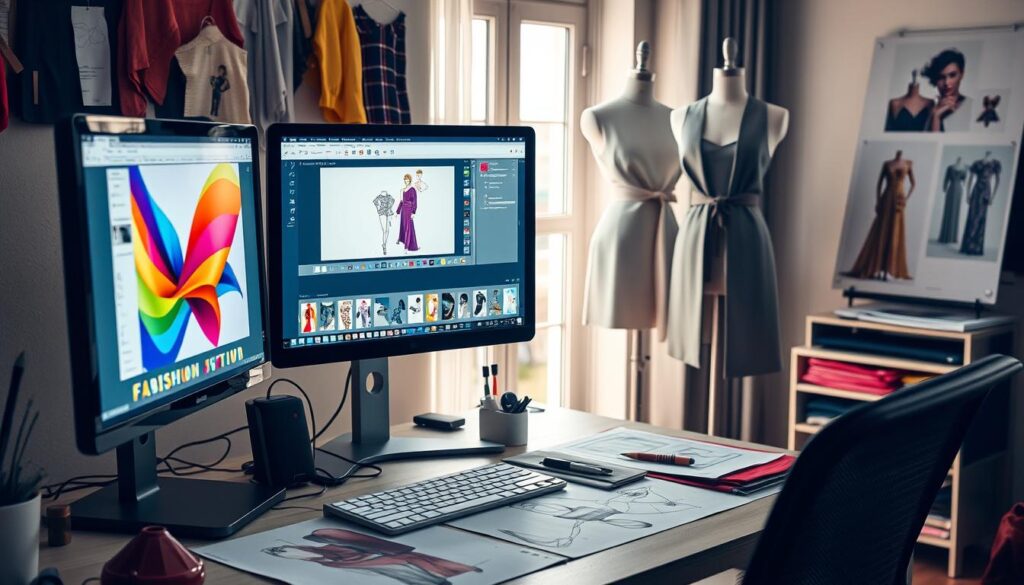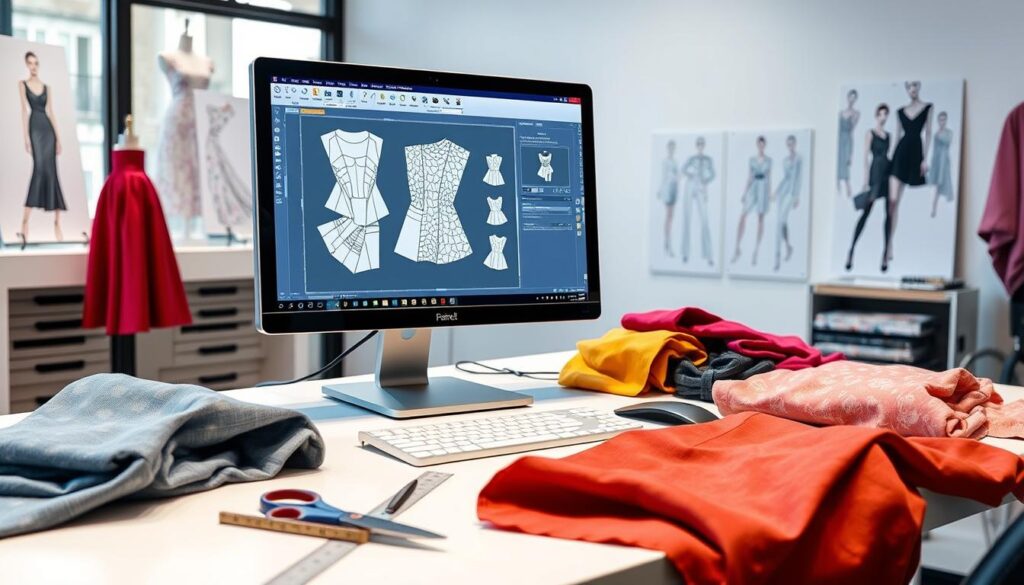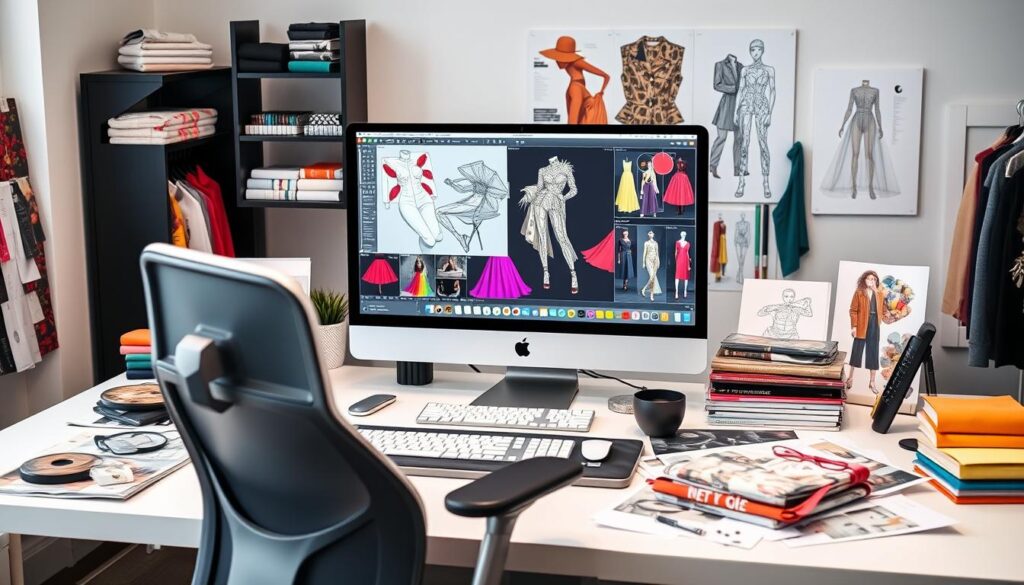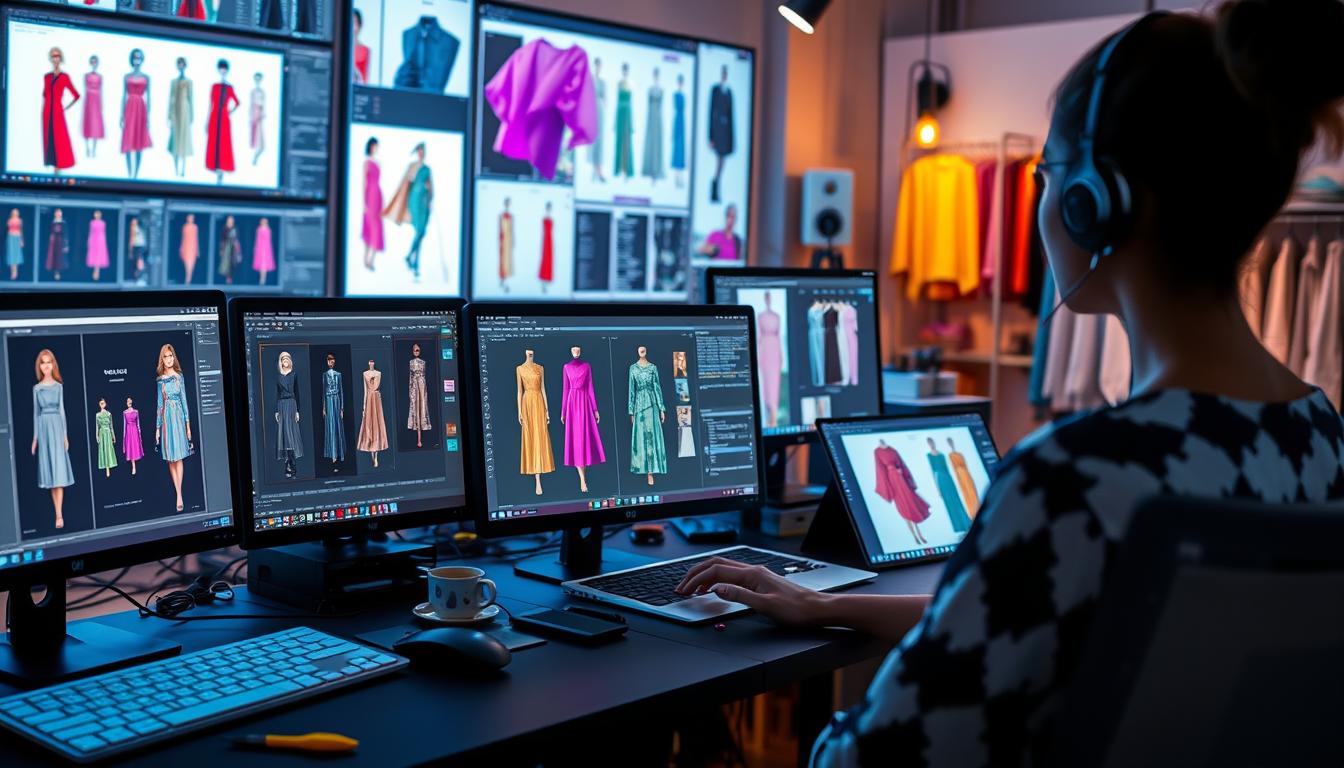In the fast-paced world of fashion, designers are always looking for new ways to turn their ideas into real clothes. The fashion design software world has many tools to help them. These tools make it easier to go from sketches to 3D models, changing the $3 trillion fashion industry for the better.
Adobe Illustrator is known for its design flexibility. CLO leads in 3D visuals. Browzwear focuses on technical details, and Style3D is easy to use. These programs help designers work together better, cut down on waste, and explore new ideas. They keep up with the industry’s quick changes.
Key Takeaways
- Fashion design software lets designers turn their ideas into real clothes through sketching, 2D pattern making, and 3D visualization.
- Popular software programs like Adobe Illustrator, CLO, Browzwear, and Style3D offer a range of features and capabilities to streamline the design process.
- These tools are transforming the fashion industry by driving more sustainable and efficient design practices, reducing production waste, and enabling greater collaboration.
- Designers can explore a variety of software options, each with its own strengths in areas like vector graphics, 3D modeling, technical output, and user-friendliness.
- The choice of fashion design software can significantly impact a designer’s workflow, creativity, and overall success in the industry.
Introduction to Fashion Design Software
In the fast-paced world of fashion, technology plays a key role. It changes how designers make, see, and bring their ideas to life. At the center of this change is fashion design software. It’s a set of tools that designers can’t live without.
What is Fashion Design Software?
Fashion design software is a tool that lets users make 2D and 3D designs. It’s used for sketches, illustrations, and detailed plans. These textile design tools and apparel CAD systems are vital. They help cut down on waste, support green design, and make the design process smoother.
Importance in the Fashion Industry
Fashion design software has changed the game in the industry. It lets designers see their designs in virtual fashion showrooms before making them. This saves time, money, and helps the environment. Designers can try out different ideas, patterns, and fabrics. This ensures their final product is top-notch and matches their vision.
“The fashion industry has seen a significant shift towards utilizing clothing design software to enhance creativity and efficiency.”
Technology has changed how designers work. It lets them explore new ideas, work with teams from afar, and create in a more sustainable way.
Key Features to Look For
When picking fashion design software, look for features that boost your creativity and technical skills. The right software can turn your fashion dreams into reality. It should have an easy-to-use interface and offer top-notch design tools.
User Interface and Experience
The software’s user interface and experience are key to your success. Choose programs with a clean layout for easy navigation. Tools that are easy to use and customizable workspaces can make your design process smoother.
Design Tools and Capabilities
Good design tools are crucial for any fashion software. Look for digital drapery simulation, realistic digital print design, and advanced color management. Also, technical drawings, pattern making, and grading are vital for making your designs ready for production.
Integration and Compatibility
Fashion design often requires working with others, like textile suppliers and manufacturing teams. Choose software that works well with industry-standard files and makes sharing and controlling versions easy. Being compatible with AI fashion trend forecasting tools can also improve your workflow.
By focusing on these features, you can find the perfect fashion design software. It will help you achieve your creative goals with ease and precision.
Top Fashion Design Software Programs
The fashion world is changing fast. New virtual fit technologies, 3D modeling services, and CAD fashion design software are key for today’s designers. These tools make creating designs easier, better, and faster.
Adobe Illustrator: The Industry Standard
Adobe Illustrator is top for making vector drawings and 2D patterns. It has great design tools and lots of tutorials. Fashion designers love it for its precision and control.
CorelDRAW: Versatile Design Options
CorelDRAW is a full package for graphic design, including vector illustration and typography. It meets many fashion designers’ needs. It’s great for making eye-catching designs, from first sketches to final products.
CLO 3D: Realistic Clothing Visualization
CLO 3D is a leading 3D modeling services software for realistic clothes. It has top-notch simulation and a huge material library. Designers can see how clothes will look and fit before making them.
These software programs help at every stage of design, from sketches to CAD fashion design software outputs. They help designers work better, be more creative, and make their fashion better and faster.
“The adoption of 3D fashion design software leads to drastically fewer physical samples being produced per garment, reducing costs, textile waste, and carbon emissions.”
Software for Beginners
Starting in fashion design can feel overwhelming. But, there are many easy-to-use software options for beginners. These beginner-friendly design tools help new designers create professional-looking work without needing to be tech experts.
Canva: Simple and Accessible
Canva is a favorite for its simplicity. It has a drag-and-drop interface and lots of templates. This makes it easy for beginners to make stunning fashion designs, mood boards, and sketches.
Sketch: Intuitive for Fashion Concepts
Sketch is also great for beginners. It’s easy to use and powerful. Its vector tools help designers make clean, scalable illustrations.
These fashion design software tutorials and beginner-friendly design tools make starting in digital fashion easy. They let designers try new things, improve their skills, and bring their ideas to life. This way, they can focus on their creativity and learn at their own speed.

“Tailornova’s development has been described as revolutionary for anyone in the fashion industry, cutting down the design development process by more than half the time, as attested by a testimonial from Rebecca Cahua of D.a.D Sewing House.”
Advanced Fashion Design Software
The fashion world is changing fast, and designers are using new software to make their work easier and more creative. Optitex and Lectra are leading the way with tools for 3D design, digital cloth simulation, and CAD systems.
Optitex: Revolutionizing 3D Design
Optitex offers top-notch 3D design tools for fashion pros. They can make their designs come to life in 3D, making changes and checking fits easily. This way, designers save time, use less material, and improve their work.
Lectra: Comprehensive Fashion Solutions
Lectra is known for its wide range of fashion design software. It has strong integrated CAD systems that link all parts of the design process. Designers can work better, team up more easily, and get their designs to market quicker.
Optitex and Lectra are changing the fashion world with their advanced tools. These tools help designers be more creative, work faster, and innovate more.
“The integration of 3D design tools and digital cloth simulation has been a game-changer for the fashion industry, allowing designers to explore their ideas more freely and bring them to life with unprecedented accuracy.”
Specialized Software for Specific Needs
The fashion world is always changing, and designers need special software to keep up. Tools like TUKAcad and SnapFashun help with pattern making and predicting trends.
TUKAcad: Pattern Making and Grading
TUKAcad is a top-notch tool for making and tweaking patterns. It’s great at making precise patterns ready for production. It also helps designers use fabric better, making the design process smoother.
SnapFashun: Trend Forecasting and Mood Boards
SnapFashun is all about predicting trends and making mood boards. It helps designers keep up with new trends. With SnapFashun, designers can make mood boards that show off their ideas and inspire their work.
There’s also new virtual showrooms like Virtuality Fashion, powered by C-DESIGN. This platform lets designers get feedback on their designs right away. It makes the design process better by working together and improving ideas.
These special tools meet the needs of fashion designers. They make the design process smoother and help designers stay ahead. With these tools, designers can make their ideas come to life more easily and accurately.
| Software | Specialization | Key Features | Pricing |
|---|---|---|---|
| TUKAcad | Pattern Making and Grading | Precision pattern drafting, efficient marker making | Custom pricing |
| SnapFashun | Trend Forecasting and Mood Boards | Trend analysis, mood board creation | Custom pricing |
| Virtuality Fashion (C-DESIGN) | Virtual Showroom | Real-time feedback on designs | Custom pricing |

These specialized software solutions cater to the specific needs of fashion designers, seamlessly integrating into their workflow and elevating their creative capabilities. By leveraging these niche tools, designers can streamline their processes, stay ahead of the curve, and bring their visions to life with greater efficiency and precision.
Pricing and Budget Considerations
Fashion design software prices vary a lot. Some offer free trials, like CLO with 14 days and MarvelousDesigner with 30 days. Others have student discounts to help students afford them. For example, CLO’s student subscription is just $25 a month, making it affordable for aspiring designers.
Most software uses a subscription model. Prices range from $29 a month to hundreds of dollars a year for advanced tools. Browzwear’s VStitcher, for example, has a free version for non-commercial use, helping those on a tight budget.
Choosing the right software depends on your budget and needs. Free trials are great for trying out different programs. They help you find the best fit before committing to a subscription. The choice between free and paid options should match your design goals and workflow.
Free vs. Premium Software Options
Designers have many free and premium software options. Free tools like Canva and Sketch are good for beginners. They offer simple interfaces and basic design tools. Premium programs, such as Adobe Illustrator, CorelDRAW, and CLO 3D, have advanced features for experienced designers.
Subscription Models Explained
Many software companies use the subscription model. This lets users pay monthly or annually. It’s flexible, as designers can adjust their subscriptions as needed. It also means software providers can keep improving their tools, giving users the latest features.
Cloud-Based Solutions
The fashion world has seen a big change with cloud-based computing. It’s now easier for designers to work together and create. Tools like C-Design Fashion and Stylezone by Browzwear bring many benefits to fashion pros.
Advantages of Cloud Computing in Fashion Design
Cloud-based solutions make it easy to share information in real-time. They also update automatically, so designers can work on any device, anywhere. These platforms let designers show and explore 3D designs together, improving teamwork.
They also save space and power, letting designers focus on their work. This means less worry about hardware and more time for creativity.
Popular Cloud-Based Fashion Design Software
- C-Design Fashion – A cloud-based platform for teamwork, 3D views, and smooth design flows.
- Stylezone by Browzwear – A cloud tool for 3D garment views, making design and development easier.
- Digital Fashion Pro – A cloud software with tools for sketching, 2D patterns, and 3D views.
- EFI Optitex – A top cloud 3D fashion design tool for virtual samples, patterns, and planning.
These cloud tools help designers work together better, no matter where they are. They make the fashion world more productive and collaborative.

| Software | Price | Key Features |
|---|---|---|
| C-Design Fashion | Price On Request | Cloud-based fashion design, 3D visualization, collaboration tools |
| Stylezone by Browzwear | Price On Request | Cloud-based 3D garment prototyping, interactive design |
| Digital Fashion Pro | $25 /Month | Cloud-based fashion sketching, 2D pattern making, 3D visualization |
| EFI Optitex | Price On Request | Cloud-based 3D fashion design, virtual sampling, production planning |
Collaboration Tools in Fashion Design
The fashion world is changing fast, making teamwork more important than ever. Now, many design software programs have added features for working together from afar. These tools are changing how designers and their teams work together, no matter where they are.
Working with Teams Remotely
Software like CLO and Browzwear has cool tools for teamwork. They let teams edit designs live, talk via video, and chat instantly. This makes it easy for team members to share ideas and make decisions online.
File Sharing and Version Control
These software programs also make sharing files and keeping track of changes easy. C-Design Fashion is a great example. It has a place for everyone to see and share designs, sketches, and 3D models. This keeps everyone on the same page and helps projects move forward smoothly.
These tools have really changed the game for fashion designers. They make it easy to work together, even if they’re far apart. This helps designers be more creative and productive, no matter where they are.
“90% of fashion designers who engage in collaborative projects find real-time editing features in design software to be crucial for maintaining consistency in vision and reducing miscommunications.”
As the fashion world keeps growing, more designers will use these tools. This will make teams even more connected and creative, all over the globe.
Tutorials and Learning Resources
The world of fashion design is always changing. It’s key to keep up with new software and techniques. Luckily, there are many tutorials and resources to help designers improve and stay current.
Online Courses and Certifications
Top fashion design software providers offer detailed online tutorials and courses. For example, CLO, a well-known 3D clothing simulation software, has lots of video tutorials. They cover everything from the basics to advanced techniques.
Also, online learning platforms like Udemy and Coursera have a wide range of fashion design software training. They offer everything from beginner classes to specialized certifications.
YouTube Channels for Design Tips
- Fashion Design Software Training: This channel has detailed tutorials on various fashion design software. It includes Adobe Illustrator, Clo3D, and Browzwear.
- Online Learning Platforms: Skillshare and CreativeLive offer tutorials and classes on fashion design software. They cover topics like pattern making, 3D modeling, and digital sketching.
- DIY Fashion: These channels give step-by-step guides on making your own fashion designs. They use different software tools, encouraging you to try new things.
By using these tutorials and resources, both new and experienced fashion designers can grow their skills. They can stay on top in the fast-paced fashion world.

“Continuous learning is the minimum requirement for success in the fashion industry. Whether it’s mastering new software, exploring emerging design trends, or staying informed about consumer preferences, the most successful fashion designers are those who never stop evolving.” – Jane Doe, Lead Designer at Acme Fashion
Case Studies and Success Stories
The fashion world has changed a lot thanks to digital tech. Many brands now use new software to make their designs better. This has made their work more efficient, helped them work together better, and made their designs more sustainable.
Impact of Software on Fashion Brands
Big names like Champion, Lululemon, and Hugo Boss have started using 3D design software. This tech has sped up their design work. It has also cut down on the need for many samples and made teamwork better. This has made their work more efficient and green.
Innovators Who Utilized Technology
Some leaders in fashion have used new tech to make their designs better. For example, a tech expert made ClothingGAN to help design clothes. Another company, DataGrid, used tech to make clothes fit better. Generative AI has also helped with predicting trends and improving marketing.
EILEEN FISHER is a great example. They use Centric PLM to make their design process better. This tech has helped them work more smoothly and focus on being green.
HOPESHOW is another success story. They teamed up with Centric PLM to make their work faster and more efficient. This shows how digital tech can really help fashion brands succeed.
“The integration of innovative software solutions has been a game-changer for many fashion brands, enabling them to achieve greater efficiency, collaboration, and sustainability in their design and production processes.”
Conclusion: Choosing the Right Software
When picking fashion design software, think about what you need, your budget, and your skill level. The future will bring more AI, better sustainability tools, and cool virtual reality features. Keeping up with new software trends is key for designers and brands to stay ahead.
Key Takeaways for Creators
Fashion design software has many perks. It makes drawing precise and fast, and boosts creativity. It also automates boring tasks, giving designers more time to be creative.
Features like base mannequin templates and symmetry tools are important. Also, updates and teamwork tools make designing better.
Future Trends in Fashion Design Software
AI will play a bigger role in fashion design software. It will help with ideas, variations, and images. This opens up more creative options for designers.
Sustainable design and virtual reality will also become more common. As the industry changes, software that meets fashion’s needs will be vital. It will ensure designers have all the tools they need.



